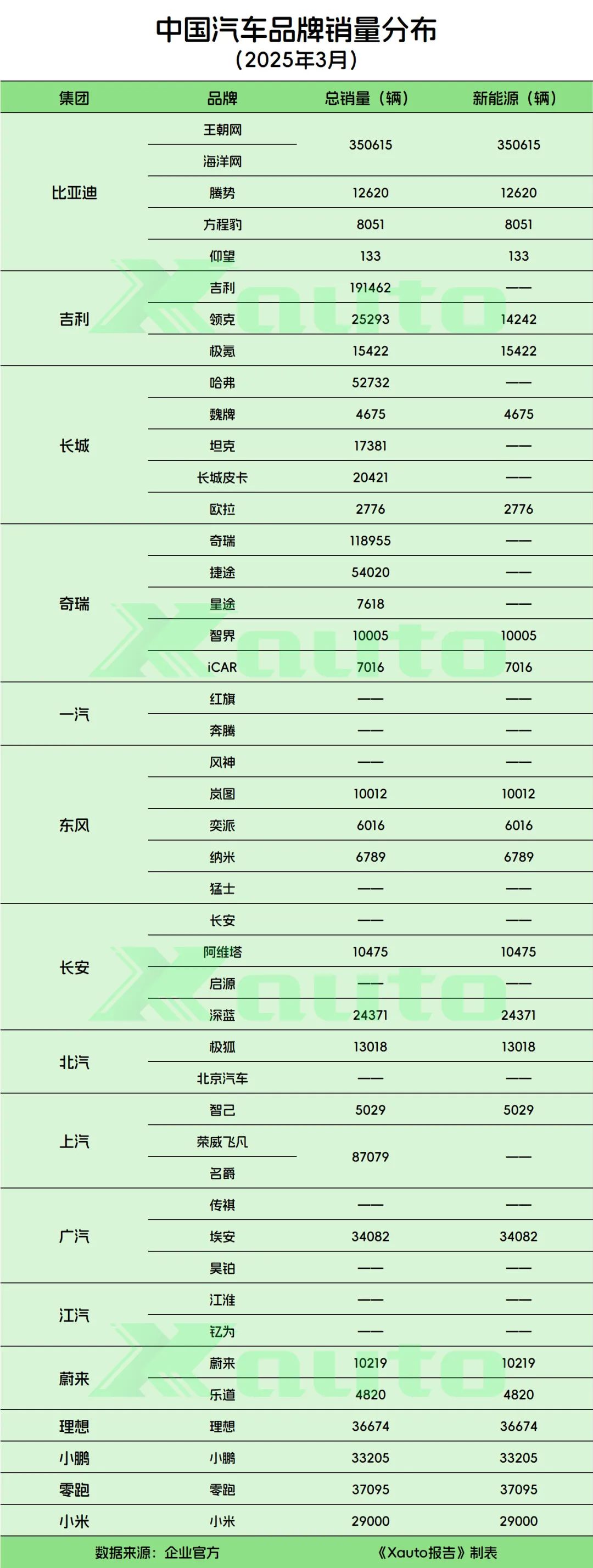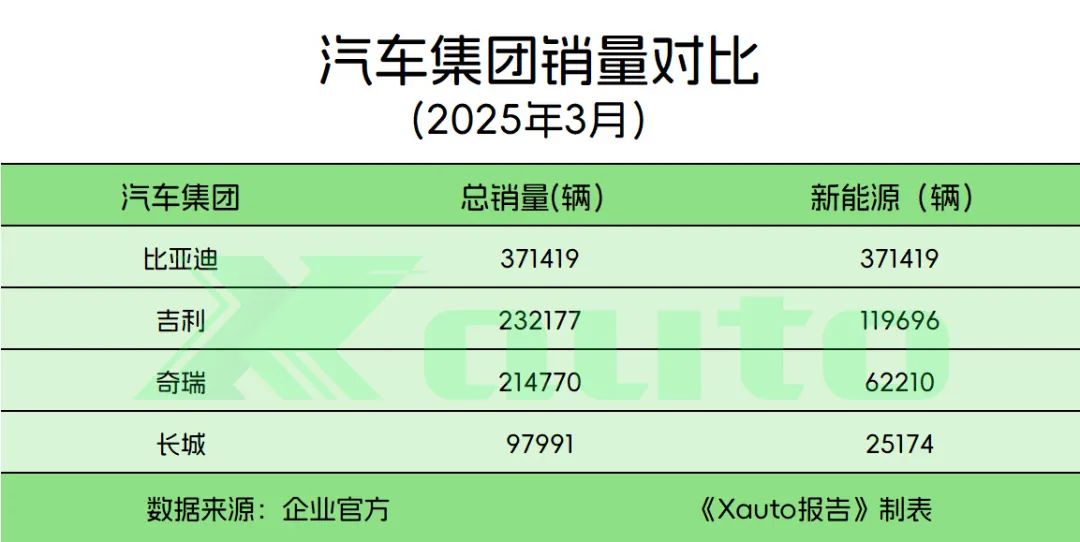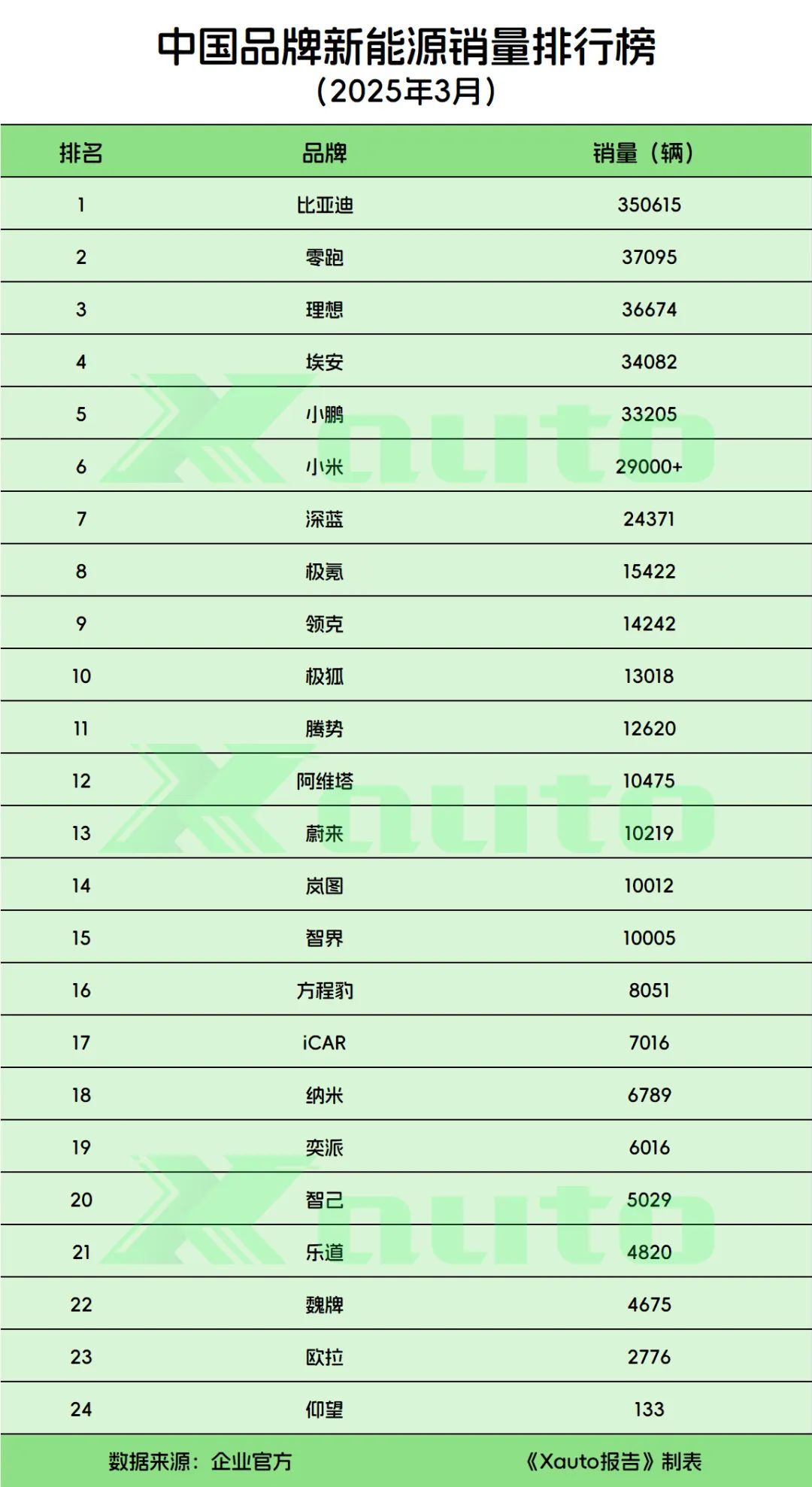March 2025 Sales Analysis for 16 Auto Groups
![]() 04/02 2025
04/02 2025
![]() 515
515
On April 1st, automotive companies unveiled their March sales figures. As of publication, 14 out of the 16 auto groups tracked by the 'Xauto Report' have released their data, with some companies disclosing sales figures for select brands only.
Let's delve into the overall picture.

In terms of March sales performance, every brand witnessed a notable uptick compared to February.
Among the four major auto groups—BYD, Geely, Chery, and Great Wall—BYD continues to dominate with sales exceeding 370,000 units.
Geely and Chery follow closely in second and third place, respectively, with sales surpassing 230,000 and 210,000 units. Notably, the proportion of new energy vehicle (NEV) sales for these two companies stood at 55.7% and 29%.
Great Wall Motors sold nearly 100,000 units in March, with NEVs accounting for 25.7% of total sales.
Evidently, BYD has achieved a full transition to NEVs, while Geely is swiftly progressing, with NEV sales outpacing those of fuel vehicles in March.
However, Geely Auto CEO Gan Jiayue emphasized that fuel vehicles remain a crucial segment of the automotive market, and Geely intends to continue catering to this market while developing products aligned with user needs and market dynamics.

As March began, automakers intensified their new model launches, aligning with the promotional rhythm of the Shanghai Auto Show in April. Numerous new cars, including the Wenjie M8, Lynk & Co 900, AITO 06, Zeekr 007GT, FANGCHENGBAO Titan 3, Leapmotor B10, and Hyper GT HL, were unveiled and pre-sold.
Inspired by BYD's 'Intelligent Driving for All' strategy, automakers like Geely and Chery have also joined the intelligent driving race, hosting consecutive strategy launch events.
Both SAIC Motor and GAC Group have strengthened their cooperation with Huawei in the realm of intelligence.
SAIC Motor plans to introduce a fifth brand under HarmonyOS Intelligence, tentatively named 'Shangjie'.
GAC Group, on the other hand, intends to invest 1.5 billion yuan to establish Huawei Auto Technology Co., Ltd., aiming to create an independent high-end auto brand. Models under this brand will be equipped with Huawei's intelligent driving, cockpit, and vehicle control solutions.
Another competitive theme in March was the increased investment in charging and battery swapping infrastructure.
BYD unveiled its self-developed all-liquid-cooled megawatt flash charging pile with a maximum output of 1,360kW, planning to build over 4,000 such stations nationwide.
Zeekr also announced the upcoming release of a 1,200kW all-liquid-cooled charging pile in the second quarter of this year.
In the battery swapping sector, NIO and CATL forged a strategic partnership. CATL plans to invest 2.5 billion yuan in NIO Power, and the two parties aim to jointly build the world's largest passenger vehicle battery swapping network.

In the above ranking of Chinese auto brands' NEV sales, we have included domestic brands that actively disclose their sales data.
Observing the NEV ranking, besides BYD's indisputable lead, Leapmotor stood out in March by securing the monthly sales crown among new automakers for the first time.
Leapmotor's new model, the Leapmotor B10, is set to launch in April, already garnering market attention and expected to perform well. Its subsequent sales are highly anticipated.
Lixiang, Aion, and Xiaopeng all surpassed 30,000 units. Notably, Xiaomi's auto delivery capacity achieved another milestone, delivering over 29,000 vehicles in March, on the cusp of crossing the 30,000-unit threshold.
Deep Blue's sales in March were robust, exceeding 24,000 units, marking significant growth from February. Since August 2024, Deep Blue's sales have consistently been above 20,000 units, peaking at 36,000 units in November and December. Whether it can sustain sales above 20,000 units and strive for 30,000 units will be worth monitoring.
Brands such as Zeekr, Denza, and NIO delivered around 10,000 units in March. Achieving further growth is the focus for these three high-end auto companies.








